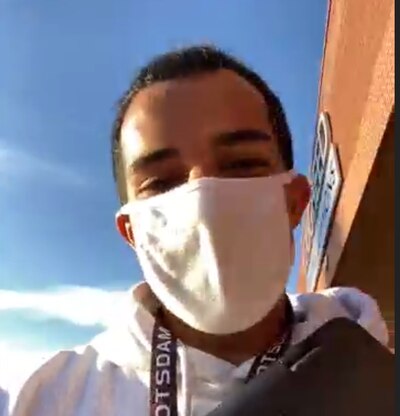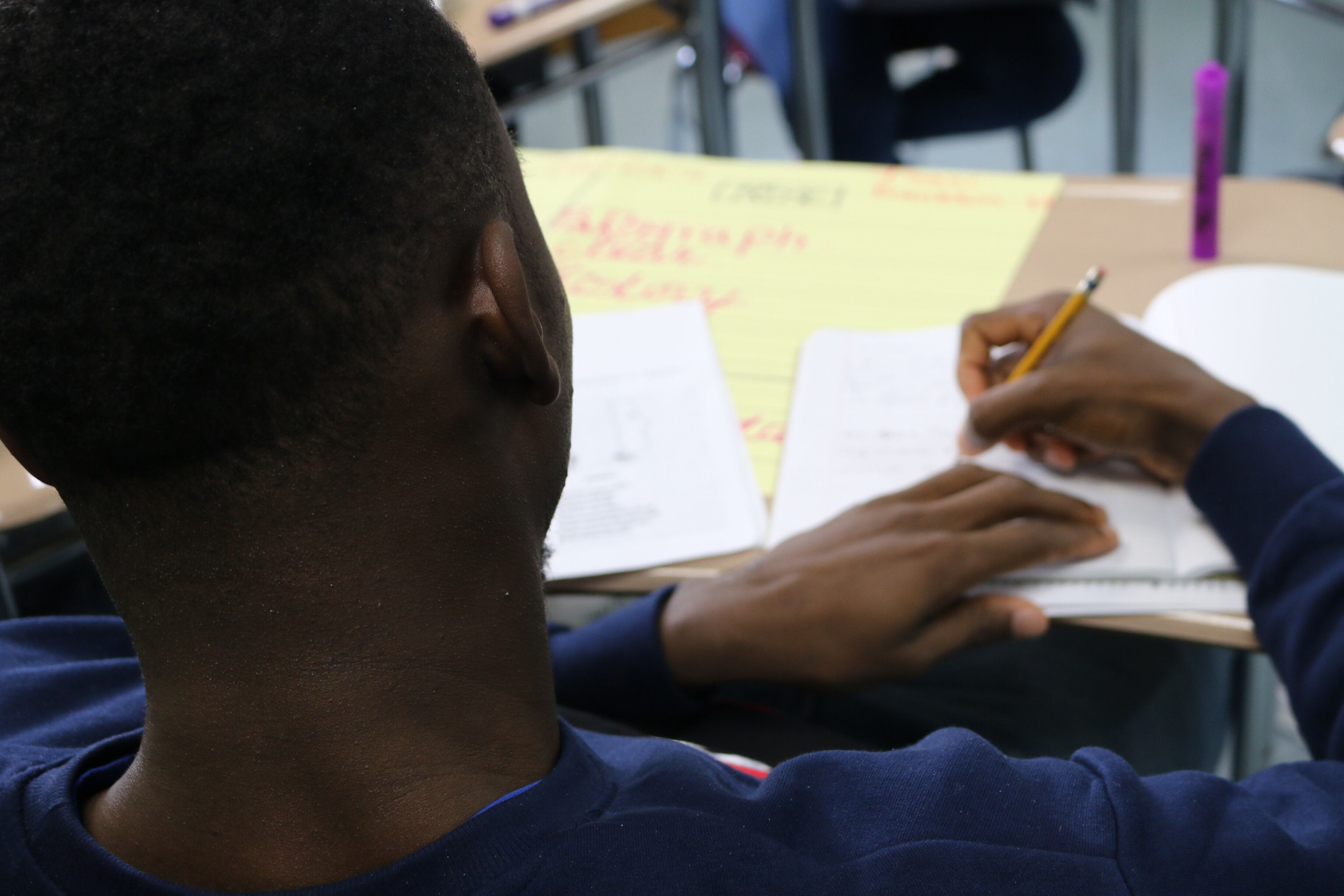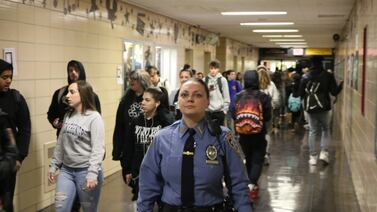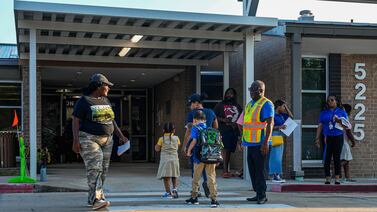After moving from Yemen to the Bronx three years ago, Ahmed Edhah had his heart set on leaving the city for college, hoping to move from the two-bedroom apartment he shared with his mother, brother, grandmother, and uncle to a more pastoral setting.
The pandemic nearly sidelined him, revealing the steep uphill climb for many first-time college-hopefuls whose families have been significantly affected by the virus in terms of their health and income.
“We all got the COVID and suffered for a few weeks. That got me thinking about how my family would be without me,” said Edhah, whose income as a store clerk for 30 hours a week helped support his relatives. “[But] I wanted to go away so I can focus on my education more.”
It took months for Edhah and his family to recover from the coronavirus and recoup lost income. Edhah then planned to attend Lehman College, close to his home, until his mom and his high school’s college counselors, teachers and principal pushed him to stick to his dream. He is now encouraging students from his alma mater, English Language Learners And International Support Preparatory Academy (ELLIS), to follow their higher education aspirations as well, recently sharing his story from his dorm room at SUNY Potsdam during one of 15 virtual college tours the school organized, connecting alumni with current ELLIS students.
Jackie Peña, one of the college counselors at ELLIS Prep, which exclusively serves older immigrant students, organized the tours to help show current students that “there is a light at the end of the tunnel,” even in the middle of a global pandemic. She wanted Edhah to share his story with current students to show them that attending a four-year college can be within reach. Many experts agree that holding frequent informational sessions about college with students can help them stay focused even if they’re the first ones in their family trying to attain higher degrees.
As the coronavirus keeps students from having regular interactions with guidance or college counselors, it can be difficult for them to navigate the maze to college, such as staying on top of application deadlines, filling out financial aid forms, and finding scholarship opportunities. This process is already dizzying for immigrant students who are the first ones in their families to attend college in the U.S., Peña said. She’s concerned the pandemic has exacerbated those challenges and made it harder for families who may be struggling financially to “buy into this idea” of higher education.
“A lot of it has to do with personal relationships and staying in touch with young people and dropping in and saying, ‘Oh hey, did you get those forms filled out,’” said Julie Sugarman, senior pre-K-12 education policy analyst at the Migration Policy Institute’s National Center on Immigrant Integration Policy. “All of those in-person moments really are what make those efforts successful to keep kids on the track, because there are so many forms to fill out and questions to ask.”
Students of color, immigrant students, and students from low-income households are less likely to fill out FAFSA and other aid forms that help pay for college, compared to their white and more affluent peers, said Sally Mayes, chief of staff at Education Trust-New York, which tracks college access data. The number of New York high school seniors who completed FAFSA forms dropped by more than 2 percentage points in the 2019-2020 school year, when buildings were closed in the spring, after the rate remained nearly unchanged the previous year, the group found.
Nationally, first-time freshman enrollment dropped by 13% compared to last year, with greater declines among Black, Hispanic and Native American students, according to figures compiled by the National Student Clearinghouse Research Center, based on data from three quarters of higher education institutions. Those drops could be attributed to various factors, such as financial strains and more students taking a gap year.
Events like the virtual tours organized by ELLIS could help reverse some of those trends, some experts said.
It’s important to show students different examples from their own communities about what “the college journey” can look like for them, such as examples of immigrant students that started at a community college and then moved to a four-year institution, said Vanessa Luna, co-founder of ImmsSchools, which holds family workshops and provides professional development for educators on supporting for undocumented students.
But not all types of virtual events may be helpful for immigrant students, Luna said, explaining that individual targeted support is important. She recently met an undocumented student who attended a virtual college informational session with 50 other students — a forum that felt too public to ask personal questions about immigration status and financial aid, the student reported to her.
Additionally, nearly all of the families who have asked her organization for more information about financial aid had no idea that New York’s undocumented students can now receive in-state tuition assistance through the New York DREAM Act, Luna said.
“We’re seeing this as a trend, that they’re not getting the necessary support in this moment when it comes down to college access,” Luna said.
Getting ELLIS students interested in college involves frequent discussions about higher education but also campus visits, since most of their students have never seen a college campus nor have the resources to go on their own, Pena said. In past years, about 100 ELLIS students would pack into buses and travel upstate over two days to see several campuses. The school also held workshops for their parents so they could understand financial aid. Without those opportunities, Peña became concerned about students losing these critical sources of information, especially as the pandemic has left many of their families grappling with lost jobs or other financial stressors.
So at the start of the school year, Peña and some colleagues arranged more than a dozen virtual college visits over one week and plan to arrange virtual family workshops. The tour garnered participation from 110 students — similar to the number of students who attend in-person tours, she said.
About 10 students, along with a smattering of ELLIS teachers, logged onto Zoom to view the virtual tour of SUNY Potsdam where Edhah showed them his dorm room and the view of campus from his room window.
He told students about the differences between a high school and college workload, and then school officials spent some time explaining scholarship and financial aid opportunities that Edhah is taking advantage of. Edhah then left his dorm, and with the help of a friend, used an iPhone to show students around campus.

Following a couple minutes of spotty internet, Edhah showed off a couple of his favorite cafeterias, the library where he studies each day, the student union, and the soccer field.
The pandemic’s mark on the school was clearly visible.
The cafeteria workers all wore masks. Virtually no other students were walking around outside. Edhah, also masked, showed students an empty classroom, where all the desks had been pushed together because it hadn’t been used for months. Signs were up barring people from congregating in certain indoor spaces.
“Hopefully, your freshman year will be different from mine,” Edhah told the students.
When it came time for questions, no student focused on the pandemic. “What’s your funniest experience in college so far?,” one student asked. “How do you create a connection with other students in Potsdam?,” another wanted to know.
Awa Traore, 19, is a senior at ELLIS Prep, who attended Edhah’s tour. SUNY Potsdam is one of several colleges she’s considering for next fall. The tour did not change her outlook on higher education, since she’s long believed in enrolling in college to study law or medicine, and her teachers frequently talk to the students about their options, she said.
Seeing a former classmate on a university campus felt motivating for Traore, who moved to the Bronx from Mali in 2017.
“I was happy for him,” Traore said. “When I see him, I was like, ‘This is gonna be me one day.’”





